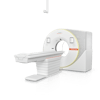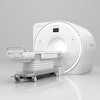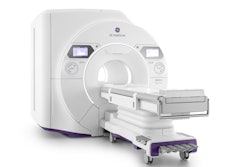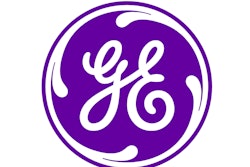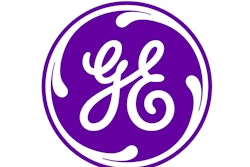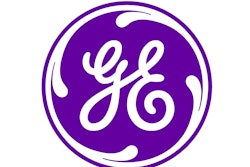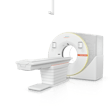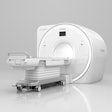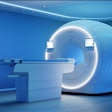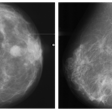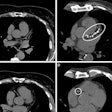CHICAGO – A new SPECT/CT system and a range of AI technologies aimed at improving operational efficiencies were among the highlights for GE HealthCare at RSNA 2024.
Molecular Imaging
At the meeting, GE unveiled Aurora, a dual-head SPECT/CT device. Aurora features the company's Revolution Ascend CT technology and boasts a 40 mm CT detector and a 75 cm wide bore. It also features ASiR-V, software that reduces dose and noise levels and improves spatial resolution; SnapShot Freeze 2, which reduces blurring caused by motion; SwiftScan SPECT, which reduces scan time by 25%, according to the firm; and SmartMar, which reduces the impact of metal in the body on image quality. Aurora is currently pending U.S. Food and Drug Administration (FDA) clearance.
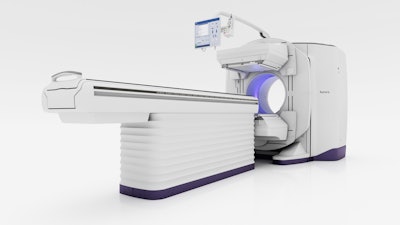 GE HealthCare's new Aurora dual-head SPECT/CT scanner. Image courtesy of GE HealthCare.
GE HealthCare's new Aurora dual-head SPECT/CT scanner. Image courtesy of GE HealthCare.
GEHC also directed attention to Clarify DL, a deep-learning image reconstruction package (awaiting FDA clearance), and the integration of its Omni Legend PET/CT into its Adventure Series themed imaging rooms for pediatric patients.
Finally, the company showcased MINItrace Magni, a small footprint cyclotron it introduced earlier this year at the Society of Nuclear Medicine and Molecular Imaging annual meeting (SNMMI), as well as offerings from its new acquisition, MIM Software, which include MIMNeuro centiloid scaling for PET-based amyloid quantification and MIM SurePlan MRT's Monte Carlo software intended to standardize dosimetry in theranostics applications.
In other molecular imaging developments, GE HealthCare announced during the meeting that it has agreed to purchase full ownership of Japan radiopharmaceutical firm Nihon Medi-Physics (NMP). The company, which had previously held a 50% stake, acquired the remaining share of NMP from Sumitomo Chemical.
NMP owns 13 manufacturing facilities, and its product portfolio includes GE HealthCare’s Vizamyl amyloid visualization radiotracer, DaTSCAN agent for Parkinson’s diagnosis, and Myoview SPECT myocardial perfusion imaging agent. It also provides research and development, including nonclinical and clinical development of radiotracers and theranostics research, according to the vendor.
The deal, which is subject to regulatory approvals, is expected to be completed in early 2025.
What’s more, GEHC said that it’s collaborating with researchers at Peter MacCallum Cancer Centre in Australia to evaluate new long axial field-of-view PET/CT technology. The technology is designed to provide high image quality at an ultralow dose in order to facilitate investigations for new clinical pathways in oncology, according to the vendor.
CT
In CT, the company highlighted its Revolution Apex platform's ECG-less cardiac capability and TrueFidelity DL images for cardiac applications. Revolution Apex also now features Energy Saving Mode 2.0, which shifts the scanner into low-power mode when it is not being used; this feature can reduce power consumption by 80%, according to GEHC.
The firm is making True Enhance DL and TrueFidelity DL available to new and existing users of its Smart Subscription program. It also announced that its AW Trajectory Planning software is now available with interventional radiology firm Imactis's CT-Navigation technology.
Finally, GE HealthCare introduced Versa Viewer, software that streamlines the presentation of AI results.
Enterprise Imaging / AI
In addition to highlighting AI technologies throughout the exhibit area as well as its recently announced partnership with RadNet, GE HealthCare announced support for Blackford’s AI orchestration platform and selective third-party AI-based applications on its True PACS and v7 PACS offering. The collaboration will enable AI to be integrated into the PACS reading workflow, according to the company.
GE HealthCare also showcased CareIntellect for Oncology, a work-in-progress cloud-based application that uses generative AI to summarize clinical notes and reports from multimodal patient data on disparate systems. With CareIntellect for Oncology, care teams can quickly understand disease progression and flag potential treatment plan deviations, according to the vendor.
The company plans to make CareIntellect for Oncology in the U.S. in 2025. The application will first focus on prostate and breast cancer, but GE HealthCare plans to also expand soon after into new disease types and care areas. Tampa General Hospital and UT Southwestern Medical Center have signed on as early evaluators of CareIntellect for Oncology.
In other AI news, GE HealthCare has secured FDA 510(k) clearance for ClearRecon DL, an AI-based image reconstruction algorithm that aims to improve cone-beam CT (CBCT) image quality in the interventional suite. Available on its Allia systems, ClearRecon DL also removes streaks without introducing additional artifacts, according to the vendor.
MRI
In the MRI section of its booth, GEHC spotlighted Signa Magnus, a 3-tesla, head-only system that was cleared by the U.S. Food and Drug Administration in November and features the vendor's HyperG gradient coil. The company also demonstrated new capabilities for its Sonic DL 3D software, which now includes 3D volumetric imaging for brain, spine, orthopedic, and body exams; the software produces 86% faster scans, the company said.
Women’s Imaging
Just prior to the meeting, GE HealthCare introduced its new Pristina Via mammography system. Pristina Via includes zero-click acquisition functionality, no wait time between exposures, vendor-neutral prior image comparison, and low radiation dose for all breast thicknesses, according to the vendor It also incorporates enhancements to minimize repetitive tasks and streamline workflows for mammography technologists, GEHC said.
Ultrasound
In ultrasound, GE HealthCare discussed its Caption Guidance AI-based technology for guiding users on adjusting ultrasound probes in cardiac imaging. The vendor has also incorporated Caption AI into its Vscan Air SL handheld ultrasound system.
In addition, the company launched a new trial opportunity for its Digital Tools for Vscan Air. Its recently announced Venue point-of-care ultrasound tablet system was also on display.
Sustainability
In addition to incorporating sustainability features in many of its new offerings, GEHC emphasized its Circularity and Environmentally Conscious Design program, which aims to extend the lifespan of products and, if necessary, provide dedicated teams to manage recycling and refurbishing of systems, according to the company.
In addition, the company reiterated its commitment to reach net zero carbon emissions by 2050.
For full 2024 RSNA coverage, visit our RADCast.
